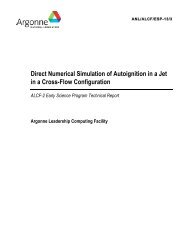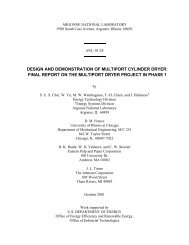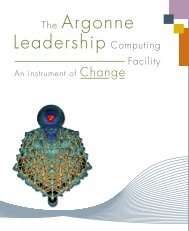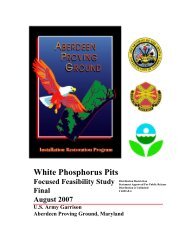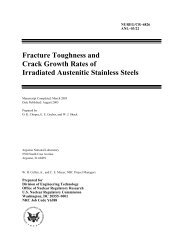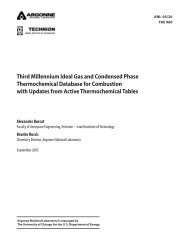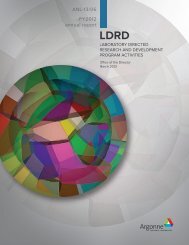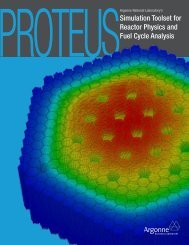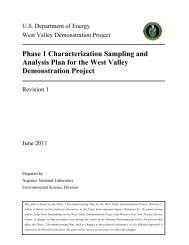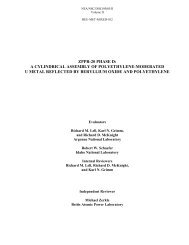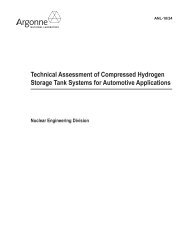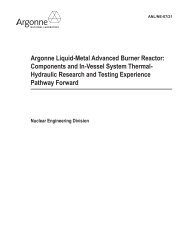ALCF Science 1 - Argonne National Laboratory
ALCF Science 1 - Argonne National Laboratory
ALCF Science 1 - Argonne National Laboratory
Create successful ePaper yourself
Turn your PDF publications into a flip-book with our unique Google optimized e-Paper software.
argonne leadership computing facility<br />
Chemistry<br />
Accurate Numerical Simulations of Chemical Phenomena Involved<br />
in Energy Production and Storage with MADNESS and MPQC<br />
Researchers propose to focus on the problems of catalysis and<br />
heavy element chemistry for fuel reprocessing—both of which<br />
are of immediate interest to the Department of Energy (DOE), are<br />
representative of a very broad class of problems in chemistry, and<br />
demand the enormous computational resources anticipated from the<br />
next generation of leadership computing facilities. Also common to<br />
both is the need for accurate electronic structure calculations of heavy<br />
elements in complex environments.<br />
Early <strong>Science</strong> Program<br />
Allocation:<br />
7.5 Million Hours<br />
EARLY SCIENCE PROGRAM<br />
Catalysis: A catalyst greatly improves the efficiency of a desired<br />
chemical reaction, and catalytic processes are directly involved in the<br />
synthesis of 20% of all industrial products. Within the DOE mission,<br />
catalysts feature prominently in cleaner and more efficient energy<br />
production, exemplified by the fuel cell and storage technologies. To<br />
date, catalysts have been designed largely using trial and error, e.g.,<br />
synthesizing and testing a potential new catalyst to determine if the<br />
reaction is more efficient. This process is both expensive and timeconsuming<br />
and rarely leads to novel catalysts. Computational modeling<br />
and simulation can improve this process, supporting experiment<br />
by improved analysis and interpretation of data, and ultimately,<br />
in partnership with experiment, enabling the design of catalysts<br />
from first principles. Researchers will focus, in collaboration with<br />
experimentalists at ORNL, on chemical processes on imperfect metaloxide<br />
surfaces.<br />
9<br />
Heavy element chemistry for fuel reprocessing: In collaboration<br />
with experimentalists and theorists, researchers will focus on two<br />
aspects of heavy element chemistry for fuel reprocessing: molecular<br />
interfacial partitioning and ligand design. Critical to both are rapid, yet<br />
quantitative, models for the interaction of heavy elements with novel<br />
organic ligands, and the interaction of both with a multispecies solvent.<br />
Speed is essential for combinatorial design due to the evaluation of a<br />
huge number of candidates, and also to enable ab initio dynamics for<br />
the inclusion of finite temperature and entropy.<br />
Contact Robert Harrison<br />
Oak Ridge <strong>National</strong> <strong>Laboratory</strong> | harrisonrj@ornl.gov



